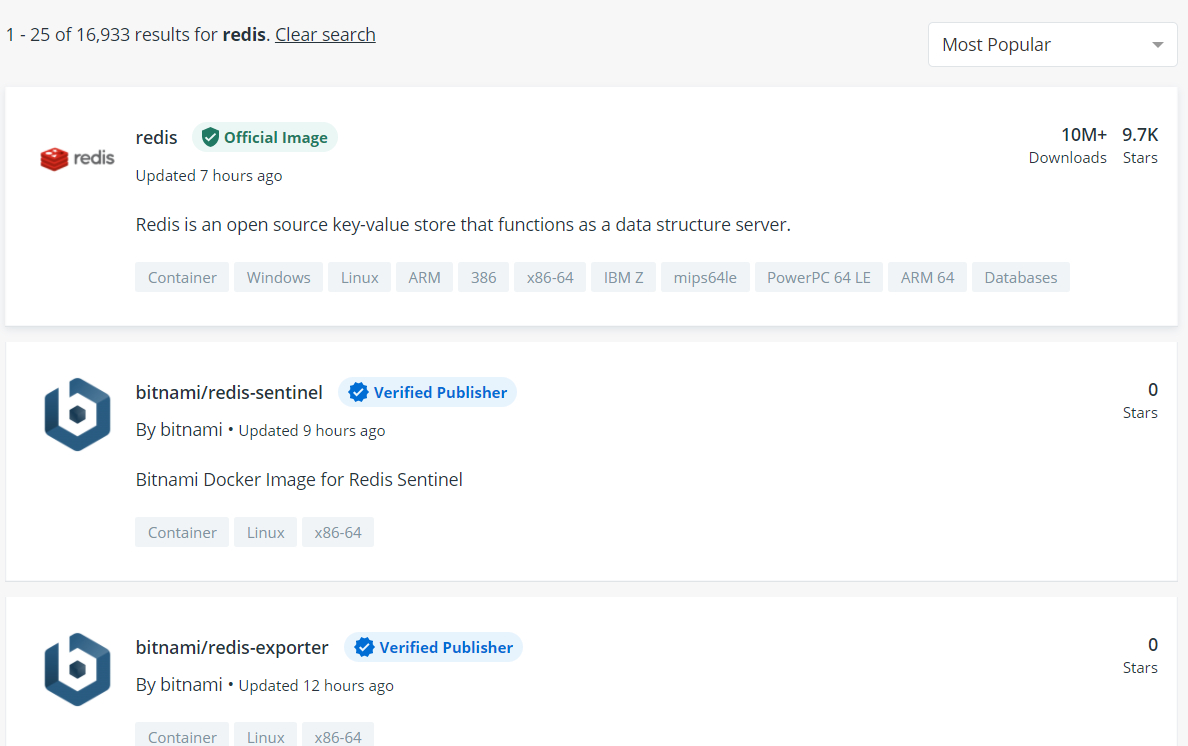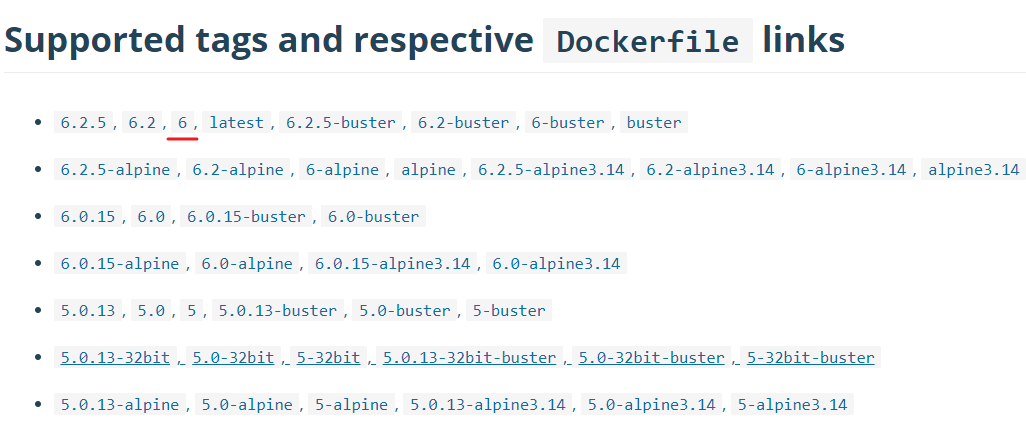[docker series] docker learning II, common commands of docker
Basic help commands
# View the basic version information of docker docker version # View the system information of docker, such as the number of images and containers docker info # View help for a command docker xx command --help
We can see the official help document: https://docs.docker.com/reference/

Mirror command
docker images view images
Usage: docker images [OPTIONS] [REPOSITORY[:TAG]]
View images on this machine
# docker images REPOSITORY TAG IMAGE ID CREATED SIZE ubuntu latest 1318b700e415 5 days ago 72.8MB hello-world latest d1165f221234 4 months ago 13.3kB
| keyword | explain |
|---|---|
| REPOSITORY | Warehouse source |
| TAG | Mirror label |
| IMAGE ID | Mirror ID |
| CREATED | Creation time |
| SIZE | Mirror size |
Optional parameters:
Options: -a, --all Show all mirrors -q, --quiet Show only mirrors ID
docker search search image
Search redis as an example
# docker search redis NAME DESCRIPTION STARS OFFICIAL AUTOMATED redis Redis is an open source key-value store that... 9734 [OK] sameersbn/redis 83 [OK] grokzen/redis-cluster Redis cluster 3.0, 3.2, 4.0, 5.0, 6.0, 6.2 78 rediscommander/redis-commander Alpine image for redis-commander - Redis man... 63 [OK]
Add parameters
Filter images with STARS greater than 2000
# docker search redis -f STARS=2000 NAME DESCRIPTION STARS OFFICIAL AUTOMATED redis Redis is an open source key-value store that... 9734 [OK]
We can also search for images directly on the dockerhub page

The search results are consistent with the results of the command search

docker pull Download Image
docker pull [OPTIONS] NAME[:TAG|@DIGEST]
Download the redis image as an example
# docker pull redis Using default tag: latest # Default pull latest version latest: Pulling from library/redis # redis Library 33847f680f63: Pull complete # Layered Download 26a746039521: Pull complete 18d87da94363: Pull complete 5e118a708802: Pull complete ecf0dbe7c357: Pull complete 46f280ba52da: Pull complete Digest: sha256:cd0c68c5479f2db4b9e2c5fbfdb7a8acb77625322dd5b474578515422d3ddb59 # autograph Status: Downloaded newer image for redis:latest docker.io/library/redis:latest # redis real download address
Therefore, the above download operation
docker pull redis is consistent with docker pull docker.io/library/redis:latest
You can view the version supported by redis on dockerhub

We download a 6 version of redis
# docker pull redis:6 6: Pulling from library/redis Digest: sha256:cd0c68c5479f2db4b9e2c5fbfdb7a8acb77625322dd5b474578515422d3ddb59 Status: Downloaded newer image for redis:6 docker.io/library/redis:6
You can see that when you download version 6 redis, there is no layered download, which indicates that they share the layered download seen above
View the image of the installation just now
docker images REPOSITORY TAG IMAGE ID CREATED SIZE redis 6 aa4d65e670d6 8 days ago 105MB redis latest aa4d65e670d6 8 days ago 105MB hello-world latest d1165f221234 4 months ago 13.3kB
docker rmi delete image
- Delete a single mirror
docker rmi -f container ID
- Delete multiple mirrors
docker rmi -f container ID container ID container ID
- Delete all mirrors
docker rmi -f $(docker images -q)
Container command
Containers are created based on images. Let's download a ubuntu image
docker pull ubuntu
docker run creates and starts a container
docker run [parameter] image name [instruction] [parameter]
Description of common parameters:
--name="xxx" # Name of the running container -d # Run in background mode -it # Run interactively -p # Specify the port number of the container, for example -p 6379:6380 Common operations are -p Host port:Container port -P # Randomly specify the port number
Start the ubuntu in the container. We can see the host switching through the host name
root@iZuf66y3tuzn4wp3h02t7pZ:~# docker run -it ubuntu /bin/bash root@87fb04e2a6e7:/#
Exit container
- Type the exit command and the container exits
- Use the shortcut keys Ctrl + P + Q to return to the host, and the container will not exit
docker ps viewing containers
docker ps [OPTIONS]
# docker ps -a CONTAINER ID IMAGE COMMAND CREATED STATUS PORTS NAMES 73f951b70438 ubuntu "/bin/bash" 2 minutes ago Up 2 minutes vigorous_buck 87fb04e2a6e7 ubuntu "/bin/bash" 7 minutes ago Exited (0) 3 minutes ago flamboyant_tu
Optional parameters:
# View running containers -a # View containers that have been run -n=xx # View the first xx containers that have been run -s # View the size of the container run -q # View container ID
docker rm delete container
docker rm container ID # Delete non running containers docker rm -f container ID # Force deletion of running containers docker rm -f $(docker ps -aq) # Delete all containers docker ps -aq | xargs docker rm # Delete all containers
Start, restart, stop, kill start, restart, stop, forcibly stop the container
docker start container ID docker restart container ID docker stop container ID docker kill container ID
Common other commands
docker run -d background start container
# Start a ubuntu in the background docker run -d ubuntu # View running containers docker ps CONTAINER ID IMAGE COMMAND CREATED STATUS PORTS NAMES
No containers found running
The reasons are as follows:
- When docker starts the service in the background, there needs to be a foreground process. Otherwise, if docker finds no application, it will stop the service
We take the initiative to add a foreground process to see the effect
# Temporarily add a foreground process docker run -d ubuntu /bin/bash -c "while true;do echo xiaozhupeiqi;sleep 2;done" # View running containers docker ps CONTAINER ID IMAGE COMMAND 10ba0e687434 ubuntu "/bin/bash -c 'while..."
It can be seen that the docker ps command can view the running container, OK
docker logs view logs
docker logs [parameter] container ID
Options: -f # Consistent with output -n # Output recent lines -t # Print timestamp
View the log of the above container
# docker logs -tf -n 5 10ba0e687434 2021-08-01T08:02:51.380512218Z xiaozhupeiqi 2021-08-01T08:02:53.381606198Z xiaozhupeiqi 2021-08-01T08:02:55.382780869Z xiaozhupeiqi 2021-08-01T08:02:57.383890580Z xiaozhupeiqi 2021-08-01T08:02:59.384977473Z xiaozhupeiqi 2021-08-01T08:03:01.386430484Z xiaozhupeiqi
docker top view the process information in the container
docker top container ID
# docker top 10ba0e68743 UID PID PPID CMD root 11101 11073 bin/bash -c while true;do echo xiaozhupeiqi;sleep 2;done root 11504 11101
docker inspect view image metadata
docker inspect container ID
A large amount of information is omitted from the output information
[
{
"Id": "10ba0e6874341b2e2f002c22613a71223ca981dc36df0d1ea4ed3bb5a7a6c58e",
"Created": "2021-08-01T07:57:52.725305443Z",
"Path": "/bin/bash",
"Args": [
"-c",
"while true;do echo xiaozhupeiqi;sleep 2;done"
],
"State": {
...
},
...
"GraphDriver": {
...
},
"Mounts": [],
"Config": {
"Hostname": "10ba0e687434",
...
"Env": [
"PATH=/usr/local/sbin:/usr/local/bin:/usr/sbin:/usr/bin:/sbin:/bin"
],
"Cmd": [
"/bin/bash",
"-c",
"while true;do echo xiaozhupeiqi;sleep 2;done"
],
"Image": "ubuntu",
...
},
"NetworkSettings": {
...
}
}
]
docker exec enters the currently running container
docker exec [parameter] container ID instruction [parameter of instruction]
# docker exec -it 10ba0e687434 /bin/bash root@10ba0e687434:/# ps -ef UID PID PPID C STIME TTY TIME CMD root 1 0 0 08:04 ? 00:00:00 /bin/bash -c while true;do echo xiaozhupeiqi;sleep 2;done root 922 0 0 08:34 pts/0 00:00:00 /bin/bash root 963 0 0 08:35 pts/1 00:00:00 /bin/bash root 972 1 0 08:35 ? 00:00:00 sleep 2 root 973 963 0 08:35 pts/1 00:00:00 ps -ef
docker attach enters the executing program in the container
docker attach container ID
docker attach 10ba0e687434
The difference between docker exec and docker attach
- docker exec
After entering the container, a new terminal will be opened and can operate normally
- docker attach
Entering the terminal where the container is executing will not start a new terminal
docker cp copies the files in the container to the host
Docker CP container ID: container file path host path
# Enter the container and create a file xiaomotong.go in the / home directory of the container docker exec -it 10ba0e687434 /bin/bash cd /home/ touch xiaomotong.go # Ctrl + P + Q exit container # Copy the files in the container to the host docker cp 10ba0e687434:/home/xiaomotong.go ./
docker stats view service memory status in docker
# docker stats CONTAINER ID NAME CPU % MEM USAGE / LIMIT MEM % NET I/O BLOCK I/O PIDS 2772a4050157 nginx1 0.00% 3.02MiB / 1.946GiB 0.15% 25.8kB / 33.1kB 0B / 8.19kB 3 10ba0e687434 loving_bohr 0.00% 4.07MiB / 1.946GiB 0.20% 810B / 0B 1.95MB / 0B 5
summary
There are still a lot of docker commands. You can try to sort out the list of common commands according to the following figure for easy query. The following pictures are from the network and are only for learning

reference material:
Welcome to like, follow and collect
My friends, your support and encouragement are the driving force for me to insist on sharing and improve quality

Well, that's all for this time
Technology is open, and our mentality should be open. Embrace change, live in the sun and strive to move forward.
I'm Nezha, the Little Devil boy. Welcome to praise and pay attention to the collection. See you next time~